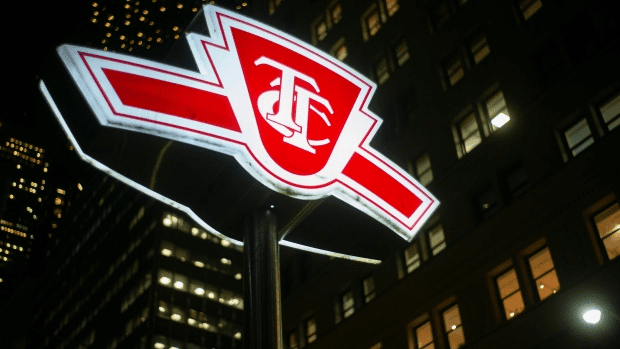
A Toronto Transit Commission sign is shown at a downtown Toronto subway stop on Tuesday, Jan. 24, 2023. (THE CANADIAN PRESS/Graeme Roy)
After a year-long tensed negotiations and public disagreements, Canada’s major telecommunication carriers have reached an agreement to provide wireless coverage in Toronto's subway system. The deal was confirmed by a spokesperson for Industry Minister François-Philippe Champagne's office on Thursday, although specific details of the agreement remain confidential.
Rogers, one of the involved carriers, expressed satisfaction with the outcome, emphasizing their commitment to bringing 5G to Toronto's subway system. However, the terms of the deal were not disclosed due to confidentiality, according to Cam Gordon, a spokesperson for Rogers.
Bell chose not to comment on the deal, and there was no immediate response from Telus when approached for a comment.
The primary issue revolved around the construction model for the TTC's mobile network, with Bell and Telus advocating for a joint build using a consortium model similar to Montreal's Metro. In contrast, Rogers had proposed a licensing fee model. The matter gained attention after Rogers acquired the network in April from BAI, leading to subsequent upgrades and the activation of cellular service in August for its customers, prompting federal government intervention.
Following the government's mandate, Rogers provided equal service levels to Bell and Telus customers in specific subway areas by October 3. Rogers then extended wireless service to all remaining subway stations and tunnels, leaving its rivals to catch up.
As of Thursday, Telus confirmed that it is now offering service in all connected areas of the TTC. Bell followed suit on Friday, announcing that Bell customers can now access talk, text, and data services in all Toronto TTC subway stations and select tunnels. Freedom Mobile also confirmed that its customers currently have service in all TTC stations and an equal portion of tunnel routes.
The progress comes after the federal government's September decision, giving carriers one month to reach a deal over wireless access on the TTC or face a 70-day arbitration process. The positive outcome was welcomed by Shelagh Pizey-Allen, executive director of the TTCriders advocacy group, who emphasized the importance of universal access to the infrastructure already in place.
Ottawa's decision mandated that all major wireless providers offer full network access in every TTC station by June 2024. Additionally, voice, text, and data services must be provided in 80% of subway tunnels by December 2025, and the entire system must have coverage by a year later.
The agreement is seen as a matter of both convenience and safety, addressing concerns about Toronto lagging behind other major cities in providing cellular access on public transit. The move is expected to enhance safety and connectivity for transit riders in the subway tunnels.















